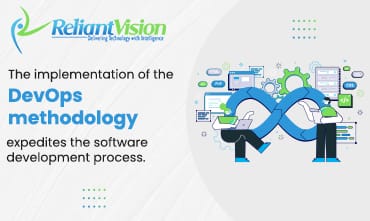Delivering high-quality software and apps more quickly and with more agility is a need in today’s tech-savvy environment. DevOps is only one example of a cutting-edge methodology that may help firms become more effective and productive.
The implementation of DevOps methodologies in software development facilitates the creation of high-performing applications through an expedited process and enhanced efficiency. Therefore, companies in all sectors have to reconsider their current approaches to software delivery and adopt the DevOps approach to development if they want to stay competitive.
In software engineering, what does “DevOps” mean?
When applied to software development, DevOps is a game-changing methodology that incorporates DevOps practices and best-in-class tools to proactively enhance an organization’s capability to deliver high-quality products at a faster pace than competitors using traditional software development processes. With this increased velocity, businesses can better serve their customers and adapt to the ever-shifting demands of the market.
How does it work?
DevOps services for software development are based on ideas that unite your development and operations teams so that they can collaborate across the SDLC to create superior software. The development team shares their various methods and tools with the operations team throughout the whole cycle.
DevOps technique emphasizes collaboration between the development and operations teams while defining each member’s responsibilities.
The Advantages of Implementing DevOps in Software Engineering
DevOps is a critical component of software development that significantly accelerates the development timeline. Additionally, it provides numerous automation benefits that facilitate the automation of the software development process. Let us delve deeper into comprehending the manifold advantages of DevOps for the software development process.
Enhanced Testing Capabilities
In software development, testing continues to be a crucial component of DevOps, where its effectiveness is largely dependent on the speed and dependability of the process. The proposed methodology ensures the development of software capable of efficiently handling high volumes of traffic, which is guaranteed through the implementation of rigorous regression testing.
A balanced combination of functional and non-functional testing is necessary when conducting software testing to identify and address any potential defects. DevOps automation greatly facilitates the scaling of systems as needed.
Integration and development.
The integration and development approaches are integral components of the DevOps software development lifecycle. This solution significantly reduces the development timeline from a span of several months or weeks to a matter of days or hours. As a result, it facilitates the integration and deployment of source code in real-time, thereby enhancing the quality and frequency of software delivery. This results in a reduction of deployment time and an acceleration of the prototype development cycle.
Improved Deployment
Integrating DevOps automation into the application development process can be a beneficial strategy when expediting the release of new feature sets and resolving bugs promptly. Accelerating the deployment process facilitates the timely delivery of new features to end-users. As a result, this enhances user engagement with the platform.
Reduced time-to-market.
In the current dynamic business landscape, enterprises strive to expedite their market entry, and the employment of DevOps automation in software development is the most expeditious approach to achieve this objective.
The DevOps methodology facilitates collaboration among various IT professionals, including developers, system administrators, and QA testers, to expedite product delivery to the market.
In a traditional setup, the development and operations teams operate independently, resulting in frequent back-and-forth communication that can impede the pace of development and deployment. The implementation of DevOps in software development facilitates the efficient dissemination of information, enabling real-time resolution of issues during the development process.
Enhanced Security
Ensuring security is a paramount consideration during software development processes. However, in traditional approaches, instances of security breaches often surface at a later stage. The DevOps automation model can enhance software resilience against bugs and errors, as well as bolster security in real-time, through the utilization of configuration management techniques, fine-grained controls, and automated compliance policies.
Reliant Vision can provide assistance to you. Reliant Vision is a DevOps company that offers robust DevOps solutions to assist you in effectively managing and implementing the three essential components of your DevOps transformation, namely People, Processes, and Technology. The DevOps solutions offered by Reliant Vision facilitate risk mitigation and a successful DevOps transformation by establishing a well-defined roadmap. This approach allows you to maintain focus on your core values and objectives.

